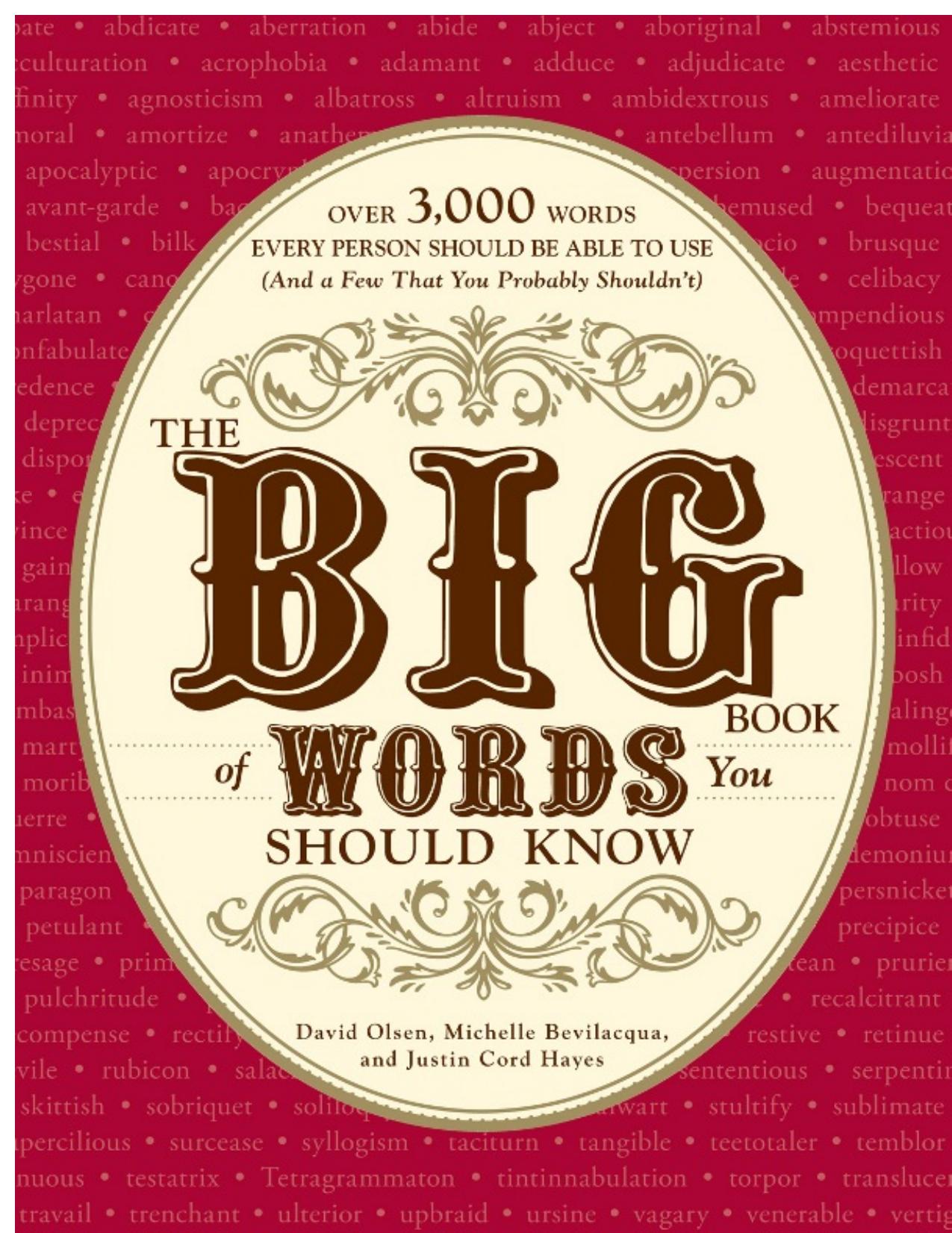The Big Book of Words You Should Know by Olsen David

Author:Olsen, David
Language: eng
Format: epub, mobi, pdf
Tags: ebook, book
Publisher: F+W Media
Published: 2009-03-24T16:00:00+00:00
PART III
Words You Should Know
but Probably Don’t
Chances are, you use many of the words in this section, but—if pressed—you would not be able to offer a definition for them. Have no fear. Once you’ve read through this list, you’ll not only use these words but you’ll actually know what they mean as well, thus gaining confidence in your ability to impress others with your sparkling communication skills.
abase (uh-BASE), verb
To humiliate or deprive of self-worth.
Melanie refused to ABASE herself for her boss over a simple clerical error.
abash (uh-BASH), verb
To disconcert, humiliate, or shame. To abash is to make another feel uncomfortable or disconcerted, or to cause someone to lose composure.
The older boys bad no qualms about ABASHING the new arrivals; it was an old tradition at the school.
abate (uh-BATE), verb
To put an end to or reduce in intensity. To abate is to reduce or diminish something. Something that lessens or weakens is abating.
The flood waters ABATED when the rain stopped.
abeyance (uh-BEY-unce), noun
Temporary suspension; a temporary pause, especially in regard to a government or court’s ruling.
To the embarrassment of the school administration, the local newspaper soon got wind of their decision to hold Chuck’s expulsion in ABEYANCE and allow him to play in the championship game.
abjure (ab-JOOR), verb
To renounce, repudiate, or reject one’s word or professed beliefs. To abjure is to solemnly swear off or recant.
After some soul-searching following his financial and domestic problems, Brad ABJURED drinking and gambling.
academic (ACK-uh-demm-ick), adjective
In addition to its noun form, which can mean “someone associated with a school” or “someone who is educated but lacks street smarts,” academic refers to theories and speculations that have no practical or useful significance.
Janet is filled with all kinds of advice on how to solve the world’s problems, but all of her solutions are ACADEMIC, and thus, worthless.
acclamation (ack-luh-MAY-shun), noun
Overwhelming approval, demonstrated by loud cheers, clapping, etc., rather than through a ballot.
The ACCLAMATION of the crowd made it very clear that Jack had won the talent show.
accrete (uh-KREET), verb
To accumulate or cause to become attached.
Dang it! Every time I park my car under a tree the candy apple red finish ACCRETES a layer of bird droppings!
acquiescence (ak-wee-ESS-unce), noun
The act of passive agreement or assent without objection. Acquiesence is the act of assenting or complying with another’s demands. Someone who submits to another’s will is acquiescent.
Hank, enchanted by first-time grandfatherhood, gave over to complete ACQUIESCENCE on his first day with little Laura.
acumen (uh-CUE-men), noun
Keenness of judgment. Acumen refers to an ability to make quick, accurate decisions and evaluations. It is characterized by rapid discernment and insight.
After only two years as a restaurant owner, Clyde developed a remarkable business ACUMEN; in a supposedly “bad location,” he had little trouble coming up with promotions that attracted customers.
adage (AD-ij), noun
A short proverb or saying. An adage is a brief maxim. “A stitch in time saves nine” is an example of an adage.
The old man quoted ADAGES endlessly, which the reporter dutifully took down in his notebook.
addle (ADD-ull), verb
Depending on its context, addle can mean either “to cause something to spoil” or “to make confused.
Download
The Big Book of Words You Should Know by Olsen David.mobi
The Big Book of Words You Should Know by Olsen David.pdf
This site does not store any files on its server. We only index and link to content provided by other sites. Please contact the content providers to delete copyright contents if any and email us, we'll remove relevant links or contents immediately.
Cecilia; Or, Memoirs of an Heiress — Volume 1 by Fanny Burney(32559)
Cecilia; Or, Memoirs of an Heiress — Volume 2 by Fanny Burney(31957)
Cecilia; Or, Memoirs of an Heiress — Volume 3 by Fanny Burney(31943)
The Lost Art of Listening by Michael P. Nichols(7507)
Asking the Right Questions: A Guide to Critical Thinking by M. Neil Browne & Stuart M. Keeley(5778)
We Need to Talk by Celeste Headlee(5617)
On Writing A Memoir of the Craft by Stephen King(4947)
Dialogue by Robert McKee(4406)
Pre-Suasion: A Revolutionary Way to Influence and Persuade by Robert Cialdini(4235)
I Have Something to Say: Mastering the Art of Public Speaking in an Age of Disconnection by John Bowe(3892)
Elements of Style 2017 by Richard De A'Morelli(3351)
The Book of Human Emotions by Tiffany Watt Smith(3310)
Fluent Forever: How to Learn Any Language Fast and Never Forget It by Gabriel Wyner(3088)
Name Book, The: Over 10,000 Names--Their Meanings, Origins, and Spiritual Significance by Astoria Dorothy(2988)
Why I Write by George Orwell(2957)
Good Humor, Bad Taste: A Sociology of the Joke by Kuipers Giselinde(2952)
The Art Of Deception by Kevin Mitnick(2806)
The Grammaring Guide to English Grammar with Exercises by Péter Simon(2747)
Ancient Worlds by Michael Scott(2691)
